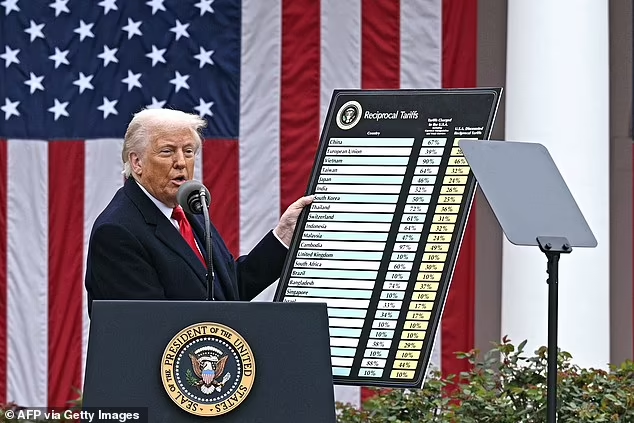A world-renowned economist was left stunned when he realized that President Donald Trump used his research to leverage his lofty worldwide tariffs – and claimed the administration grossly overcalculated how much each country owes.
University of Chicago Economics Professor Brent Neiman, a Biden-era Treasury official, said he was confused when the president held up his sign showing the amount of tariffs he would impose on 60 countries last Wednesday in what Trump dubbed Liberation Day.
‘My first question, when the White House unveiled its tariff regime was: How on Earth did they calculate such huge rates?’ he wrote in an op-ed for the New York Times.
Prof Neiman – who has prestigious degrees from Harvard, Oxford, and UPenn – had his question answered the next day, when he realized that the ordeal was ‘personal.’
‘The Office of the US Trade Representative released its methodology and cited an academic paper produced by four economists, including me, seemingly in support of their numbers,’ he said.
‘But they got it wrong. Very wrong.’
Trump’s 10 per cent ‘baseline’ tariff began Saturday, hitting all US imports except goods from Mexico and Canada. Further tariffs on goods from 57 trading partners, including the European Union and China, are set to go into effect on Wednesday.
The tariffs have triggered market meltdowns across the globe – sparking calls from his billionaire allies, including Elon Musk and Bill Ackman, to rethink the strategy.

University of Chicago Economics Professor Brent Neiman was left stunned when he learned the Trump administration invoked his research to leverage his lofty worldwide tariffs

Neiman explained that the Trump administration erroneously added a 25 per cent rate to the formula Neiman and his colleagues had created – meaning that the tariff rates Trump imposed should all be four times less.
‘Where does 25 per cent come from?’ Neiman asked, rhetorically. ‘Is it related to our work? I don’t know.’
‘Our findings suggest the calculated tariffs should be dramatically smaller – perhaps one-fourth as large.’
Neiman also hit out at the president for leveraging the ‘reciprocal tariffs’ in an effort to end trade deficits with the country’s major trading partners.
‘Is this a reasonable goal? It is not,’ he declared in his op-ed, arguing that trade balances are unavoidable and natural.
‘Americans spend more on clothing made in Sri Lanka than Sri Lankans spend on American pharmaceuticals and gas turbines. So what?’ he explained.
‘Not every country has similar natural resources or development levels,’ Neiman continued. ‘The deficit numbers don’t suggest, let alone prove, unfair competition.’
The economist also quoted Nobel laureate Robert Solow to explain his reasoning. Solow had once said, ‘I have a chronic deficit with my barber, who doesn’t buy a darned thing from me.’
‘Mr. Solow also surely ran a chronic surplus with his students and these imbalances reveal nothing about trade barriers in haircare or higher education, nor would they speak to his financial health.’
Neiman concluded by saying Trump’s tariffs ‘have enormous implications for workers, firms, consumers and stock markets around the globe’ and warned that they will ‘bring average tariff rates to their highest level in 100 years.
‘And despite being billed as a “do unto others” trade policy, they are not calculated in line with the Bible’s golden rule,’ the economist noted, saying foreign tariffs on American goods are nowhere near the levels Trump is pushing.

Neiman claimed the Trump administration erroneously added a 25 per cent rate into its calculations – meaning that all of the tariffs imposed on countries across the world are four times higher than they should be
He said by saying he wants Trump’s tariffs policy and methodology to be scrapped entirely.
Barring that, he said, ‘the administration should divide its results by four.’
On Monday, European stocks suffered their worst one-day fall since the start of the COVID pandemic and Japan’s benchmark Nikkei 225 index closed nearly 8 per cent lower than on Friday, while the broader Topix finished down 7.7 per cent.
Economists across the world now worry about a global economic downturn, with betting markets now showing a 62 per cent chance that the U.S. will plunge into a recession this year.
The odds of such an economic drop spiked when Trump announced the tariffs last Wednesday – when the odds of a recession went from 39 per cent to 49 per cent, according to Polymarket.
And on Sunday the chances reached a high of 66 per cent, showing a whopping two in three chances that a recession is nearing.


Many world leaders have now come to the negotiating table, with European Union officials announcing Monday that they have proposed a ‘zero-zero’ tariff deal in which neither the United States nor the Eurozone would leverage the fines on industrial goods.
Under the European Union’s deal, cars and other goods – including chemicals, pharmaceuticals, rubber and plastic machinery – would not face tariffs in the United States or in any of the Eurozone countries, according to Politico.
The idea had been backed by DOGE Chief Elon Musk, who told a political rally last week that he hopes to see a ‘zero tariff situation’ between the US and Europe to create a free trade zone.
Shark Tank star Kevin O’Leary pushed the president to take the deal – which he called an ‘off-ramp.’
He claimed it would be a win for the United States as the Eurozone charges a tariff of 10 per cent on imported American vehicles – largely preventing them from entering the European markets.
At the same time, Volkswagen announced on Monday that Audi is holding its cars at US ports – preventing them from entering the US market.




